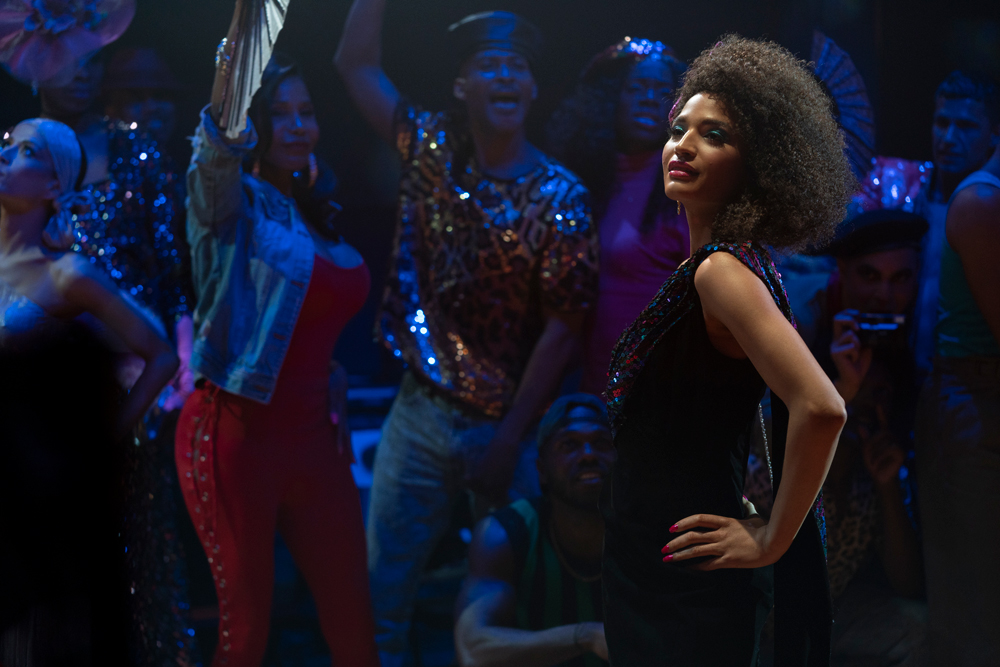
Pose came twirling and voguing back into the world for its second season, fully energized and more focused than ever. Something we said in our reviews of the first season bears repeating here: it’s a miracle a show like this even exists. Not just because the people of the ball scene circa 1990 would have considered the idea of a mainstream show depicting their lives nearly unimaginable. Not just because Pose employs the highest number of transgender actors, actresses, writers and producers anyone has ever hired for one project. Those things are pretty miraculous, of course, but what really impressed and surprised us this time around was how much of a leap forward in quality and complexity the writing has taken.
The show continues to be, at its heart, a surprisingly conventional family drama. Remove the queer aspects of the story and you’re left with universal tales about hopes and dreams, heartache and passion, money problems, family dinners and moral guidance. This is, in many ways, the truly subversive part of the show. Granted, it’s not exactly shocking in 2019 to put forth the idea that queer people often form families around themselves after their families of origin rejected them. What’s interesting is how the show uses those very relatable and universal themes to explore and explain one of the most potent and longstanding acts of social revolution the world has ever seen.
Pose is as much polemic and history lesson as it is story; a quality that likely contributed to the show’s unevenness in the first season. With this premiere, it feels like everyone involved in the creation of this show figured out how to straddle that line; how to teach history, make points in an ongoing debate and still serve up drama-filled moments of grandeur, beauty and heartbreak. One of the ways it manages to exist in both worlds – as a dramatic piece and also a historical polemic – is to center the idea of revolution and change. It’s one of the most potent and often-stated themes of the episode and both the writing and direction utilized it extremely well and effectively. First and most obvious is how the show uses ballroom categories to underline narrative themes. There isn’t a bit of subtlety to a drag ball re-enactment of Marie Antoinette’s beheading in an episode where everyone talked about revolution, of course. But the whole point of the ball background of this story is to use the theatricality and clearly defined allegory of it all in order to tell the stories of its participants. That is, at its essence, what ballroom culture is all about.
Any scene of Blanca pounding her fists on a table and proclaiming her plans to change the world, reverse the course of history and save her family exists on two levels: the poignancy in the unlikelihood of her achieving these goals personally and the 2019 knowledge that, in the end, the Blancas of the world actually did change it. Can she open her own nail salon, stave off the effects of AIDS, secure a modeling career for her daughter and a dance career for her son while also establishing a legendary house of the ballroom scene? In 1990? With everything stacked against her? The truth is that it isn’t likely. The truth is also that it actually happened. The ballroom scene did launch dance, beauty and modeling careers — for some people. Protease inhibitors did come along in the near-future to dramatically slow and ultimately halt the progression of HIV — for most people. We are watching stories of people in hopeless circumstances vowing to enact changes that we know ultimately happened. Everyone in that ACT UP meeting knew on some level how ridiculously futile it was to set the Pope, of all people, in their sights, but they willed their passion and their anger to overtake their common sense in order to press forward; to make the impossible into the likely, to go from yelling their rage in church basements to changing the world.

Pose seems very aware of this push-pull; of what it’s like to be in a revolution, long before any chance of success seemed remotely possible. That perspective allows the show to put an intense focus on the bravery and strength of people to make these sorts of promises and declarations at a time when their success wasn’t just unassured, but nearly impossible to imagine. And it allows the show to wring moments of intense emotion out of history-based events like the die-in protests of ACT UP, which become something deeper in the retelling; not just anger at society’s inaction and indifference to the suffering of queer people, but in the hands of these characters, a declaration of their hopes and dreams for a way forward.
[Photo Credit: Macall Polay/FX]
Chloë Sevigny in Marc Jacobs at “The Dead Don’t Die” New York Screening: IN or OUT? Next Post:
Chris Hemsworth and Tessa Thompson at the “Men in Black: International” New York City Premiere
Please review our Community Guidelines before posting a comment. Thank you!



